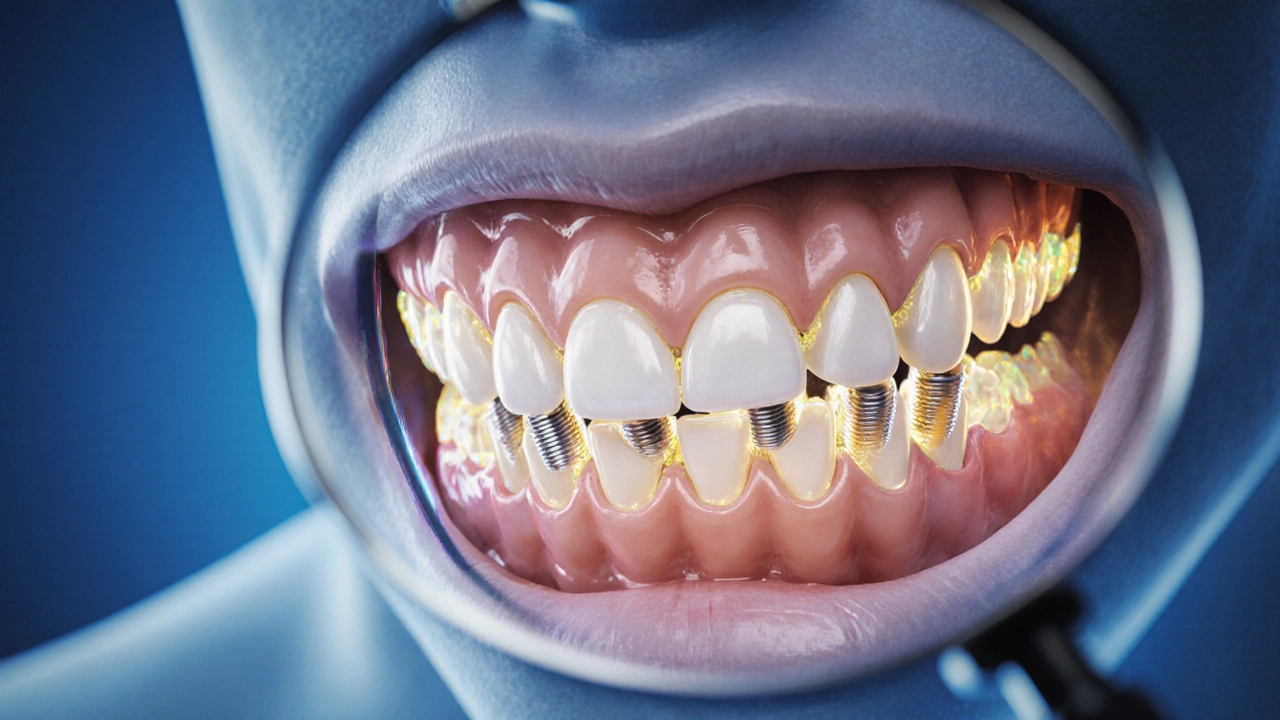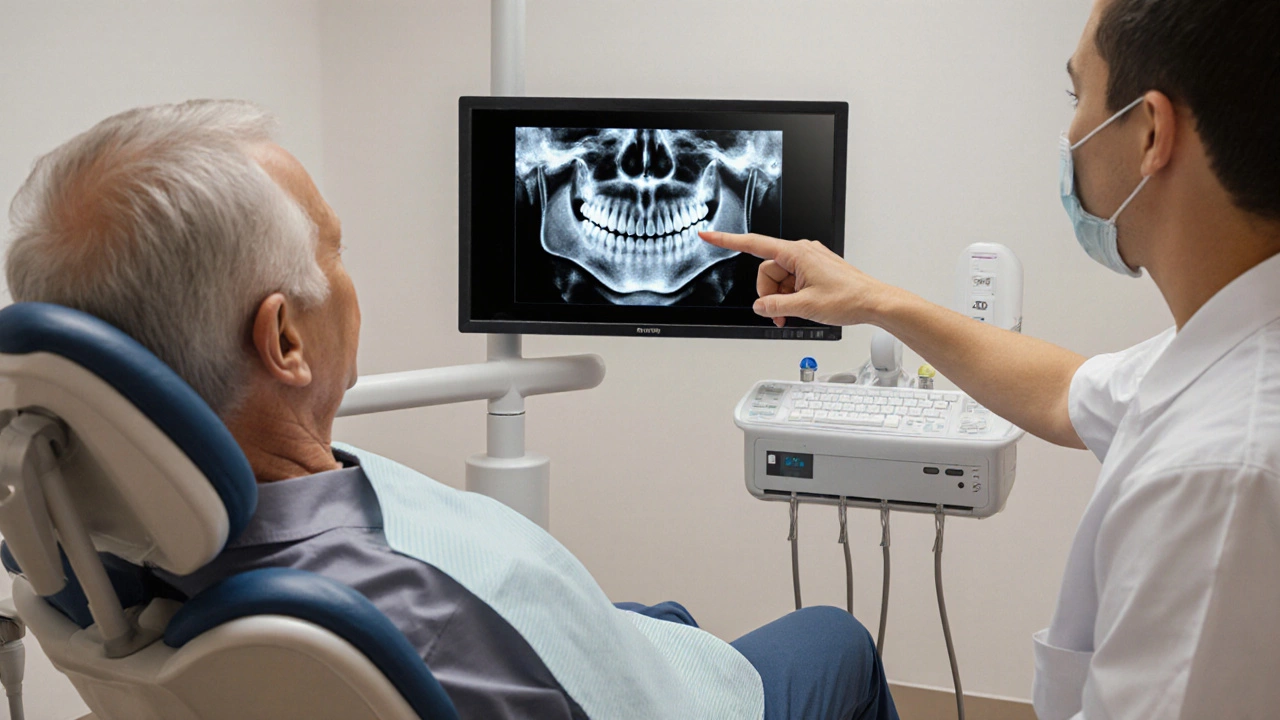Full Mouth Implant Cost Calculator
Estimate your potential costs for full mouth dental implants in the UK based on your specific needs. Note: This is an estimate only. Actual costs may vary based on clinic, location, and individual circumstances.
When your teeth are beyond saving-cracked, decayed, infected, or loose-it’s natural to wonder if removing them all and replacing them with implants is the right move. In the UK, this isn’t just a dream. It’s a common, well-established treatment called full mouth dental implants. But it’s not a simple swap. It’s a major procedure with real costs, recovery time, and long-term responsibilities. Here’s what actually happens if you choose to go this route.
Is removing all your teeth really necessary?
Not always. Dentists don’t recommend pulling every tooth unless there’s no other option. Severe gum disease (periodontitis), widespread decay, or trauma might leave you with teeth that can’t be saved. But if you have even a few healthy roots or bone structure, your dentist will try to preserve them. Full mouth extraction is usually a last resort after years of pain, failed fillings, root canals, or dentures that won’t stay in place.
Many people think they need to lose everything before getting implants. That’s a myth. You can get implants even with partial tooth loss. But if you’ve been wearing ill-fitting dentures for years, your jawbone may have shrunk. That’s when full extraction and implant-supported arches become the most reliable solution.
What does replacing all teeth with implants actually mean?
It doesn’t mean 28 individual implants. That would be expensive, invasive, and often unnecessary. Instead, most patients get implant-supported bridges. For the upper or lower jaw, you typically need 4 to 6 implants to support a full arch of 10-14 teeth. This is called an all-on-4 or all-on-6 procedure.
Here’s how it works: after extraction, titanium posts are placed into your jawbone. These act like artificial roots. After 3-6 months of healing, a custom-made permanent bridge is attached. It looks and feels like natural teeth. You can eat steak, apples, and popcorn without worry.
Some clinics offer immediate load implants. That means you get temporary teeth the same day as extraction. You leave the clinic with a full set of teeth-just not the final ones. The permanent bridge comes later, once the bone has fully bonded with the implants.
How much does it cost in the UK?
Costs vary widely depending on where you are, the clinic, and whether you go private or NHS. The NHS rarely covers full mouth implants unless there’s a medical emergency. Most people pay privately.
For one arch (upper or lower jaw), expect to pay between £8,000 and £18,000. For both jaws, that’s £16,000 to £36,000. Why the big range? It depends on:
- Number of implants needed (4, 6, or more)
- Whether you need bone grafting (common if jawbone has deteriorated)
- Quality of the implant brand (Nobel Biocare, Straumann, and Zimmer are top-tier)
- Whether you get temporary teeth the same day
- Location (London and the South East are usually more expensive)
Some clinics offer payment plans. Others include aftercare, scans, and follow-ups in the price. Always ask what’s included. A quote of £10,000 might seem cheap-but if it doesn’t cover CT scans or bone grafts, you’ll pay more later.
Is it worth the cost?
For many, yes. People who’ve struggled with dentures for years say it’s life-changing. No more slipping, clicking, or eating only soft foods. You regain confidence to smile, speak, and eat without fear.
Implants also stop jawbone loss. Dentures sit on top of the gum and don’t stimulate the bone. Over time, your jaw shrinks. Implants act like natural teeth roots-sending signals to your bone to stay strong. That keeps your face from looking sunken or aged.
Studies show full-arch implants have a success rate of over 95% after 10 years. That’s better than most dental restorations. They can last 20-30 years or more with proper care.

What’s the recovery like?
Recovery isn’t quick. You’ll be swollen and sore for 3-7 days. Pain is usually manageable with over-the-counter painkillers. Most people take a week off work.
The real healing happens over months. Your jawbone needs to fuse with the titanium implants. This process, called osseointegration, takes 3-6 months. During that time, you wear temporary teeth. You’ll need to stick to soft foods and avoid chewing on the implant side.
After the permanent bridge is fitted, you’ll need to clean it like natural teeth-brushing twice a day, flossing with special tools, and using a water flosser. You also need professional cleanings every 6 months. Neglect this, and you risk peri-implantitis-a gum infection around implants that can lead to failure.
Who isn’t a good candidate?
Not everyone qualifies. You need enough jawbone to hold the implants. If you’ve been missing teeth for years, your bone may have melted away. In that case, you’ll need a bone graft. That adds cost and time-usually 4-6 months of healing before implants can be placed.
Smokers have a much higher failure rate. Quitting for at least 3 months before and after surgery is strongly advised. Heavy drinkers and people with uncontrolled diabetes or autoimmune diseases also face higher risks.
If you’re on bisphosphonates (medications for osteoporosis or cancer), you may not be eligible. These drugs can interfere with bone healing. Always tell your dentist about every medication you take.
Alternatives to full implants
Implants are the gold standard-but not the only option.
- Traditional dentures: Cheaper (£500-£2,500 for a full set), but they slip, need adhesive, and don’t prevent bone loss.
- Implant-retained dentures: 2-4 implants hold a removable denture in place. Less expensive than full arches, but still removable and less stable.
- Hybrid dentures: A compromise-fixed teeth supported by implants, but made from acrylic instead of porcelain. Cheaper, but wear out faster.
Many patients start with implant-retained dentures and upgrade later. But if you’re done with the hassle of removable teeth, going straight for fixed full-arch implants gives you the most natural result.

How to find the right clinic
Not all dental implant clinics are equal. Look for:
- Specialist oral surgeons or prosthodontists-not general dentists doing implants as a side service
- Clinics that use 3D CT scans to plan placement
- Clear breakdown of costs with no hidden fees
- Before-and-after photos of real patients
- Guarantees on implants (5-10 years is standard)
Ask to see the qualifications of the surgeon. Are they registered with the General Dental Council? Do they have a specialist diploma in implant dentistry? Don’t be afraid to get a second opinion. A good clinic won’t pressure you into a decision.
What happens after the procedure?
Once your implants are in and your bridge is fitted, your life changes. You’ll need to adapt your oral hygiene routine. You can’t just brush and floss like normal. You’ll need:
- Interdental brushes to clean under and around the bridge
- A water flosser to flush out food particles
- Regular professional cleanings every 6 months
Some people report minor discomfort or sensitivity for the first few weeks. That’s normal. If you feel pain, swelling, or a bad taste after 2 weeks, contact your dentist immediately. Infection can spread fast around implants.
Most patients say they forget they have implants. They eat normally, laugh loudly, and don’t think twice about their smile. That’s the goal.
Final thoughts: Is it right for you?
If you’re tired of dentures slipping at dinner, avoiding social events because you’re embarrassed by your teeth, or living with constant pain-then yes, full mouth implants are worth considering. It’s a big investment in time, money, and health. But for many, it’s the first time in years they feel like themselves again.
Don’t rush. Get scans. Ask questions. Compare options. And remember: your jawbone doesn’t regenerate on its own. The longer you wait, the more bone you lose-and the more expensive and complicated the treatment becomes.
Can I get full mouth dental implants on the NHS?
The NHS rarely covers full mouth implants unless there’s a severe medical need, like cancer treatment or trauma. Most cases are considered cosmetic or elective. You’ll almost always need to go private for this procedure.
How long do full dental implants last?
The titanium implants themselves can last 25 years or more with proper care. The bridge (the teeth part) may need replacement after 10-15 years due to wear. Regular check-ups and good hygiene are the biggest factors in longevity.
Do full mouth implants hurt?
The surgery is done under local anaesthetic or sedation, so you won’t feel pain during the procedure. Afterward, there’s discomfort for a few days, similar to having wisdom teeth out. Most people manage it with ibuprofen and rest.
Can I eat normally after getting implants?
Yes-once the healing period is over. You’ll start with soft foods for the first few weeks. After the permanent bridge is fitted, you can eat anything you could with natural teeth. No more avoiding nuts, apples, or crusty bread.
What’s the difference between all-on-4 and all-on-6?
All-on-4 uses four implants per jaw, angled for maximum support. All-on-6 uses six implants, offering extra stability for patients with stronger bone or higher chewing forces. All-on-4 is more common and cost-effective. All-on-6 is recommended if you grind your teeth or have a history of jawbone loss.





